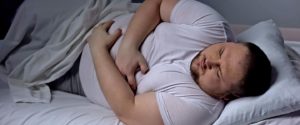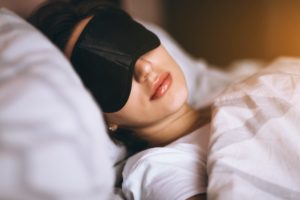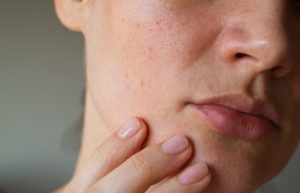Multiple Sclerosis (MS) and Sleep
Multiple sclerosis is an auto-immune disease characterized by a breakdown of the myelin sheath, the fatty insulating layer responsible for protecting the nerves in the brain and spinal cord. The damage is caused by inflammation in which the immune system incorrectly targets the body’s own central nervous system.
As the disease progresses, it can interfere with the messages between nerves, leading to involuntary muscle spasms, weakness, problems with coordination, slurred speech, and other problems. The exact nature of the symptoms varies from person to person, depending on the location of the damage.
It’s estimated that nearly 1 million Americans are currently living with multiple sclerosis, and approximately 60% of these people report sleep problems . The condition can occur at any age, but it often starts in young adulthood and is more common in women than men.
Although multiple sclerosis is a lifelong condition, symptoms may come and go and the disease itself does not necessarily lower life expectancy. Treatment of multiple sclerosis focuses on improving quality of life, including sleep quality.
How Does MS Affect Sleep?
Multiple sclerosis symptoms, as well as the accompanying stress and depression, can have a significant effect on sleep. Poor sleep quality may lead to problems with mood, energy, and even an increase in MS symptoms. This may also lead to future cognitive decline . MS and insomnia treatment requires a comprehensive approach that takes various factors into account.
Physical health plays a major role in MS and sleep. Muscle spasticity, facial pain, or unpleasant tingling sensations may make it difficult for MS patients to find a comfortable position at night. Many people with MS also have trouble controlling their movements and may be unable to change sleeping positions as often as they would like. Staying in one position for prolonged periods of time may cause bedsores, leading to further discomfort.
A significant number of multiple sclerosis patients also experience frequent nighttime urination. Waking up multiple times during the night to use the bathroom is disruptive to sleep, leading not only to less sleep but also reducing the time spent in deep sleep. Medications and a lack of exercise due to MS-related disabilities also take their toll on sleep.
Overall, up to 90% of people with MS report suffering from fatigue , which sometimes appears long before the official MS diagnosis. Fatigue is a general term used to refer to feelings of exhaustion that make it difficult to carry out daily activities. This goes beyond normal tiredness and may not improve even with rest.
Fatigue is considered one of the most debilitating MS symptoms, yet it often fails to receive the attention it deserves as many people assume it to be a natural side-effect of MS-related discomfort. Yet fatigue in MS likely stems from a number of causes, such as an underlying sleep disorder or abnormal levels of melatonin or pro-inflammatory cytokines, both of which play a role in regulating sleep.
In multiple sclerosis, fatigue is often accompanied by pain, anxiety, stress, and depression, all of which can exacerbate one another. Moreover, those who nap during the daytime to combat fatigue may end up having trouble getting quality sleep at night.

What Sleep Disorders Are Common in People With MS
In addition to the general discomfort caused by MS symptoms, people with this condition are more likely to have one or more co-existing sleep disorders . The most common multiple sclerosis sleep disorders are insomnia, restless legs syndrome, sleep-disordered breathing, narcolepsy, and REM sleep behavior disorder. In many cases, these appear to result from lesions to specific areas in the brain or spinal cord, meaning that symptoms may vary from person to person depending on the location and severity of their lesions.
Insomnia: Insomnia refers to difficulty falling asleep, staying asleep, or sleeping well. Pain, discomfort, sleep disorders, frequent nighttime urination, and other factors can all contribute to insomnia in people with MS.
Circadian Rhythm Sleep Disorders: Circadian rhythm sleep disorders affect the body’s natural sleep-wake cycle and can lead to insomnia, daytime sleepiness, or both. Abnormalities in melatonin production in MS patients may be partly responsible for the higher prevalence of circadian disruptions and resulting fatigue in MS patients.
Restless Legs Syndrome (RLS) and Periodic Limb Movement Disorder (PLMD): People with experience tingling sensations that cause an irresistible urge to move their legs, while those with experience twitches or other movements during the night. Both conditions can be distracting when trying to sleep and may cause nighttime awakenings that lead to poor sleep quality and fatigue.
Sleep-Disordered Breathing: The most common type of sleep-disordered breathing is sleep apnea, in which a person suffers disrupted sleep due to multiple lapses in breathing. Sleep apnea often appears in MS patients who have lesions in the brainstem . In most cases, it can be treated with a continuous positive airway pressure (CPAP) machine, which helps regulate breathing.
Narcolepsy: People with narcolepsy are vulnerable to episodes of extreme sleepiness during the day, which may be accompanied by muscle paralysis or hallucinations. Studies have tied both narcolepsy and MS to lesions in the lateral hypothalamus, which is responsible for regulating wakefulness.
REM Sleep Behavior Disorder: As we dream during rapid eye movement (REM) sleep, our bodies typically experience atonia, or paralyzation of the muscles. In REM sleep behavior disorder, this function is faulty, leading patients to act out their dreams, sometimes in violent or dangerous ways. REM sleep behavior disorder seems to occur more often in MS patients with damage to the brainstem.
If you suspect that you or a loved one may have a sleep disorder, talk to your healthcare professional. They can conduct a polysomnography, or sleep test, during which they will look for signs of a sleep disorder and work with you to develop an appropriate treatment plan if a disorder is found.
How Can People With MS Cope With Sleep Issues?
Certain lifestyle changes may help improve sleep for those with MS. Perhaps the simplest place to start is with sleep hygiene, which refers to behaviors during the day and at night that help promote a regular sleep-wake cycle. Sleep hygiene habits include:
Maintaining a cool, dark, and quiet bedroom
Reserving the bed for sleep and sex only
Going to bed and waking up at the same time every day
Establishing a consistent bedtime routine that includes calm activities like reading or taking a warm bath
Turning off screens an hour before bedtime
Getting regular exercise earlier in the day
Eating well
Getting exposure to sunlight, especially in the morning
Avoiding alcohol, caffeine, and nicotine
Scheduling naps earlier in the day
Select aspects of the sleep routine are especially important for people with MS. For example, many MS patients are sensitive to heat , so it’s extra important to keep the bedroom at a slightly cooler temperature to promote sleep and avoid aggravating MS symptoms. Likewise, those who experience frequent nighttime urination may wish to cut out caffeine and alcohol, limit fluid intake in the hours leading up to bedtime, and visit the bathroom one last time right before getting into bed.
There are a number of ways to optimize your sleeping environment to reduce bedsores , including using a pressure-relieving foam mattress and using a pillow to cushion sensitive areas. Asking a sleeping partner to help you change sleeping positions may allow you to get more comfortable at night. You may wish to talk with your sleeping partner to find an arrangement that allows both of you to get a good rest.
Cognitive behavioral therapy for insomnia (CBT-I) may help you work through the anxiety and depression that may be keeping you awake at night. If you’re still finding it difficult to get a good night’s sleep, your doctor may be able to prescribe medication for treating nighttime symptoms. While research is inconclusive as to the role of the circadian rhythm disruptions in MS, your doctor may also recommend supplements such as vitamin D or melatonin to help regulate your sleep-wake cycle.

Still have questions? Ask our community!
Join our Sleep Care Community — a trusted hub of sleep health professionals, product specialists, and people just like you. Whether you need expert sleep advice for your insomnia or you’re searching for the perfect mattress, we’ve got you covered. Get personalized guidance from the experts who know sleep best.
References
18 Sources
-
A.D.A.M. Medical Encyclopedia. (2020, February 4). Multiple sclerosis., Retrieved November 16, 2020, from
https://medlineplus.gov/ency/article/000737.htm -
Wallin, M. T., Culpepper, W. J., Campbell, J. D., Nelson, L. M., Langer-Gould, A., Marrie, R. A., Cutter, G. R., Kaye, W. E., Wagner, L., Tremlett, H., Buka, S. L., Dilokthornsakul, P., Topol, B., Chen, L. H., LaRocca, N. G., & US Multiple Sclerosis Prevalence Workgroup (2019). The prevalence of MS in the United States: A population-based estimate using health claims data. Neurology, 92(10), e1029–e1040.
https://pubmed.ncbi.nlm.nih.gov/30770430/ -
Sakkas, G. K., Giannaki, C. D., Karatzaferi, C., & Manconi, M. (2019). Sleep Abnormalities in Multiple Sclerosis. Current treatment options in neurology, 21(1), 4.
http://link.springer.com/10.1007/s11940-019-0544-7 -
Hughes, A. J., Dunn, K. M., & Chaffee, T. (2018). Sleep Disturbance and Cognitive Dysfunction in Multiple Sclerosis: a Systematic Review. Current neurology and neuroscience reports, 18(1), 2.
http://link.springer.com/10.1007/s11910-018-0809-7 -
Leavitt, V. M., Blanchard, A. R., Guo, C. Y., Gelernt, E., Sumowski, J. F., & Stein, J. (2018). Aspirin is an effective pretreatment for exercise in multiple sclerosis: A double-blind randomized controlled pilot trial. Multiple sclerosis (Houndmills, Basingstoke, England), 24(11), 1511–1513.
http://journals.sagepub.com/doi/10.1177/1352458517739138 -
Braley, T. J., & Chervin, R. D. (2015). A practical approach to the diagnosis and management of sleep disorders in patients with multiple sclerosis. Therapeutic advances in neurological disorders, 8(6), 294–310.
https://pubmed.ncbi.nlm.nih.gov/26600873/ -
Zielinski, M. R., Systrom, D. M., & Rose, N. R. (2019). Fatigue, Sleep, and Autoimmune and Related Disorders. Frontiers in immunology, 10, 1827.
https://pubmed.ncbi.nlm.nih.gov/31447842/ -
Berger, J. R., Pocoski, J., Preblick, R., & Boklage, S. (2013). Fatigue heralding multiple sclerosis. Multiple sclerosis (Houndmills, Basingstoke, England), 19(11), 1526–1532.
http://journals.sagepub.com/doi/10.1177/1352458513477924 -
Braley, T. J., & Boudreau, E. A. (2016). Sleep Disorders in Multiple Sclerosis. Current neurology and neuroscience reports, 16(5), 50.
http://link.springer.com/10.1007/s11910-016-0649-2 -
Newland, P., Starkweather, A., & Sorenson, M. (2016). Central fatigue in multiple sclerosis: a review of the literature. The journal of spinal cord medicine, 39(4), 386–399.
https://pubmed.ncbi.nlm.nih.gov/27146427/ -
Foschi, M., Rizzo, G., Liguori, R., Avoni, P., Mancinelli, L., Lugaresi, A., & Ferini-Strambi, L. (2019). Sleep-related disorders and their relationship with MRI findings in multiple sclerosis. Sleep medicine, 56, 90–97.
https://linkinghub.elsevier.com/retrieve/pii/S1389945718303873 -
Damasceno, A., Moraes, A. S., Farias, A., Damasceno, B. P., dos Santos, L. M., & Cendes, F. (2015). Disruption of melatonin circadian rhythm production is related to multiple sclerosis severity: A preliminary study. Journal of the neurological sciences, 353(1-2), 166–168.
https://linkinghub.elsevier.com/retrieve/pii/S0022510X15001872 -
Cederberg, K., Jeng, B., Sasaki, J. E., Braley, T. J., Walters, A. S., & Motl, R. W. (2020). Restless legs syndrome and health-related quality of life in adults with multiple sclerosis. Journal of sleep research, 29(3), e12880.
https://onlinelibrary.wiley.com/doi/10.1111/jsr.12880 -
Braley, T. J., Segal, B. M., & Chervin, R. D. (2012). Sleep-disordered breathing in multiple sclerosis. Neurology, 79(9), 929–936.
https://pubmed.ncbi.nlm.nih.gov/22895593/ -
Sadeghi Bahmani, D., Kesselring, J., Papadimitriou, M., Bansi, J., Pühse, U., Gerber, M., Shaygannejad, V., Holsboer-Trachsler, E., & Brand, S. (2019). In Patients With Multiple Sclerosis, Both Objective and Subjective Sleep, Depression, Fatigue, and Paresthesia Improved After 3 Weeks of Regular Exercise. Frontiers in psychiatry, 10, 265.
https://pubmed.ncbi.nlm.nih.gov/31130879/ -
Summers, M. P., Simmons, R. D., & Verikios, G. (2012). Keeping cool: use of air conditioning by australians with multiple sclerosis. Multiple sclerosis international, 2012, 794310.
https://pubmed.ncbi.nlm.nih.gov/22548176/ -
A.D.A.M. Medical Encyclopedia. (2020, April 10). Preventing pressure ulcers., Retrieved November 16, 2020, from
https://medlineplus.gov/ency/patientinstructions/000147.htm -
Matveeva, O., Bogie, J., Hendriks, J., Linker, R. A., Haghikia, A., & Kleinewietfeld, M. (2018). Western lifestyle and immunopathology of multiple sclerosis. Annals of the New York Academy of Sciences, 1417(1), 71–86.
https://pubmed.ncbi.nlm.nih.gov/29377214/































































